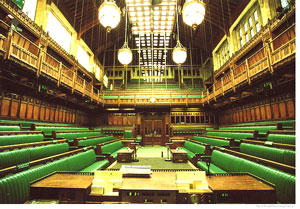What ever happened to ‘sin’?: A response to the UK Equality Bill

In April 2009, the British Labour Party introduced its Equality Bill in the House of Commons, London, in fulfillment of its 2005 election platform. This Bill has now been published in a trial format, including Explanatory Notes,1 and the Government has invited written comments from interested parties. The Government expects/hopes the Bill will become law next (UK) Spring (just before the next general election, which must be held by June 2010), and then come into force in the UK in Autumn 2010.
The Bill aims to combine all of the existing laws on equality into one Act of Parliament and thereby eliminate more forms of discrimination than are currently covered. However, far from simplifying the law, the Bill places even more complex requirements on churches and Christian organisations, who, it seems, could be forced to employ practising homosexuals or transsexuals, as well as people of other faiths or of no faith.
Under the main heading “Schedule 9 — Work: exceptions Part 1 — Occupational requirements”, and the sub-heading “Religious requirements relating to sex, marriage, etc, sexual orientation”, the Bill discusses “employment for the purposes of an organised religion”. In sub-paragraph 4, “the Bill lists six possible requirements for the purposes of religious employment. These are:
- a requirement to be of a particular sex;
- a requirement not to be a transsexual person;
- a requirement not to be married to a civil partner;2
- a requirement not to be married to, or the civil partner of, a person who has a living former spouse or civil partner;
- a requirement relating to circumstances in which a marriage or civil partnership came to an end;
- a requirement related to sexual orientation.”
On a casual reading of the Bill one gains the impression that religious organisations could be exempt from having to employ people described in the above six categories, if the employment is for the purposes of an organized religion. However, the Bill also gives three examples, which show that this is not universally the case. These are:
-
Schedule 9, Work Exceptions, Part 1, paragraph 751 of the Bill states:
“A religious organisation may wish to restrict applicants for the post of head of its organisation to those people that adhere to that faith. This is because to represent the views of that organisation accurately it is felt that the person in charge of that organisation must have an in-depth understanding of the religion’s doctrines. This type of discrimination could be lawful.”
Comment: So far, so good, but note that the Bill says “ … could be lawful”, not “ … would be lawful”.
The same paragraph 751 continues:
“However, other posts that do not require this kind of in-depth understanding, such as administrative posts, should be open to all people regardless of their religion or belief.”3
- The Explanatory Notes to this section further state: “This exception would apply to a requirement that a Catholic priest be a man.”
-
The same Explanatory Notes continue: “This exception would not apply to a requirement that a church youth worker or accountant be heterosexual.” (All emphases added.)
Comment: This appears to say that religious organisations (e.g. churches) can be discriminatory when it comes to choosing the person to head up the organization, but cannot discriminate (e.g. against homosexuals) in choosing people for lesser positions, such as youth worker or accountant. To us it would appear that the anti-Christian, anti-biblical “camel” has its nose well and truly inside the tent.
It should also be noted that it is not unknown (as many christophobes admit) for exemptions to be added to an anti-Christian bill simply to sneak it through the legislature. Afterwards, they attack these same exemptions as illogical and discriminatory, and fight for a court to overturn them.
It would seem that the concept of non-harassment of homosexuals is about to become harassment of Christians. All this being so, we were particularly interested to read any response from the Church of England.
Church of England response
What is available is a paper headed “A Church of England Response by the Archbishops’ Council”. This is dated 4 September 2007, so it is their response to an earlier proposed version of basically the same Bill, then called “A Framework for Fairness: Proposals for a Single Equality Bill for Great Britain.” This response by the Archbishops’ Council is a 14-page report, with 68 numbered paragraphs, which cover a wide range of issues.
On the issue of homosexuality, paragraph No. 67 of the above Archbishops’ Response states:
“With regard to sexual orientation and sexual activity between persons of the same sex, the Church’s long-standing teaching is well known. While a range of views on the subject is to be found within the Church of England, a substantial portion of the Church’s members continue to maintain the traditional view. We question whether there is a practical need for further anti-harassment legislation here … . If the Government were to take a different view, it would be crucial to ensure that a religion’s followers (and not just religious organisations and ministers of religion) continued to be able to express the views of their faith about homosexual conduct, including challenging people to lead lives consistent with the teaching of the Church. To deny Christians (and followers of other faiths which take a similar view) such a right would amount to an unjustified interference with the right to manifest religious belief.”
Comment: We look forward to seeing a further 2009 Response from the Archbishops now that the Bill has progressed to the current extent.
A church without the Bible is a toothless tiger!

The above Response puts forward three reasons why the church and Christians should have the right to express their views about homosexual conduct, as well as employment.
- Such conduct is contrary to the long-standing teaching of the Church.
- This teaching is the traditional view.
- Lots of Church members don’t do it.
Comment: Apparently the Archbishops did not consider what the Bible says on the subject to have been worth putting forward. And even if they had, would the writers of the Bill have taken any notice?. We live in an evolution-saturated society that says, “no God, no rules, no absolutes, no right and wrong”. It seems that the days, barely a generation ago, when an American evangelist could sway the thinking of thousands of people in every country he visited with sermons based on the theme of what “the Bible says” are now but a distant memory for the oldies.
Also the fact that it was necessary for the Response to state that “a range of views on the subject is to be found within the Church of England” surely would not have helped. How could any organisation affirm a code of moral conduct for others if it tolerates the contrary conduct within its own ranks?
The only valid reason
But why does the Church teach what it does on any subject, including sodomy? Surely the only valid reason to teach any moral precept is because of what God says in the Bible. And the Bible clearly teaches that homosexual conduct, including lesbianism, is contrary to God’s created purpose for human sexual expression (Romans 1:26–27). Furthermore conduct which is contrary to God’s will and purpose, expressed in His Word, the Bible, God calls “sin”.
So does the Church, and do Christians, have a case? Yes, indeed. “Righteousness exalts a nation, but sin is a disgrace to any people” (Proverbs 14:34). Christians have a “great commission” from God to preach the Gospel. This Gospel includes the warning that God will one day judge every person “according to their works” (KJV) or “what they had done” (NIV), (Revelation 20:11–15). God the Creator not only is God the Lawgiver, but he is also God the Judge.
The Bible teaches that God the Creator made men and women for each other, albeit within the marriage covenant. Until recent times any deviation from this has been accepted as being outside the created order. However, the attitude of society towards homosexual acts has changed. Now they are promoted as neither right nor wrong, but a “choice”. And, unless one appeals to a Creator who sets the absolute laws for life, who can say that this is incorrect? If there is no Creator who has made us and set the rules, then all our morals and ideas of what is right or wrong are simply subjective—what we ourselves decide, or what society decides so that society can do as it pleases.
There is a fundamental clash in our society today between the religion of Christianity with its creation basis and therefore absolutes, and the religion of Humanism with its evolution basis and its relative morality that says “anything goes”. These two systems cannot exist beside each other for very long, because they are mutually exclusive. Once upon a time, it was the abortionists and homosexuals, etc., who were put in jail. Now that evolution has become the accepted belief system in our society, it is those who obey the absolutes from the Bible who are threatened with legal punishment if they do not conform, as the draft Bill clearly foretells.
So what can Christians do?
- We should recognize the true reason for the moral situation in our society today, and not “go along with it”.
- We should recognize that God alone can change the hearts of men and women and convince them of their need to repent and get right with Him. This will involve prayer on our part.
- As God’s ambassadors in society and as “Salt” and ‘Light”, we need to take every opportunity to uphold the Word of God and what it says about God the Creator, Lawgiver, Judge and Saviour, and against the anti-God rhetoric of evolution. We can do this through public preaching, personal witnessing, private discussion, distributing creation literature like Creation magazine, etc. In the present situation, making submissions about the anti-Christian provisions of the Bill before it becomes Law is something that has been requested by the Bill’s formulators.
“Sin”—Huh?
Oxford University Press has removed a number of words associated with Christianity from its latest edition of the Oxford Junior Dictionary, including “sin”, “devil”, “psalm” and “saint”.4The publisher says the changes have been made to reflect the fact that Britain is a modern, multicultural, multi-faith society. Oxford University Press selects words for the junior edition with the aid of the Children’s Corpus, a list of words made up of general language, words from children’s books and terms related to the school curriculum. Lexicographers consider word frequency when making additions and deletions to the dictionary.
With fewer children in the UK exposed to Christian teaching than in past years, and references to biblical terms being purged from school textbooks, it’s hardly surprising that these words are dropping from everyday language—and hence from the dictionary.
How much harder will it be for evangelists to tell this generation that Jesus died “for their sins”? (Hebrews 7:27)
References
- Available at http://news.parliament.uk/2009/04/equality-bill-published-in-trial-format/. Return to text.
- According to Wikipedia: “Civil partnerships in the United Kingdom, granted under the Civil Partnership Act 2004, give same-sex couples rights and responsibilities identical to civil marriage. Civil Partners are entitled to the same property rights as married opposite-sex couples, the same exemption as married couples on inheritance tax, social security and pension benefits, and also the ability to get parental responsibility for a partner’s children,[1] as well as responsibility for reasonable maintenance of one’s partner and their children, tenancy rights, full life insurance recognition, next-of-kin rights in hospitals, and others. There is a formal process for dissolving partnerships akin to divorce.” Return to text.
- See <http://www.publications.parliament.uk/pa/cm200809/cmbills/085/09085_iw/09085_iw_en_1.htm> Return to text.
- Henry, J., Words associated with Christianity and British history taken out of children’s dictionary, The Telegraph (UK), <www.telegraph.co.uk/education/3569045/Words-associated-with-Christianity-and-British-history-taken-out-of-childrens-dictionary.html>, 8 December 2008. Return to text.

Readers’ comments
Comments are automatically closed 14 days after publication.